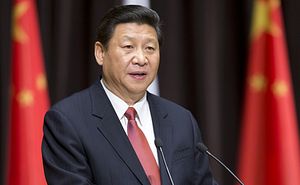Nearly two years in, Xi Jinping’s anti-corruption campaign is still going strong. While the campaign has successfully brought down high-ranking “tigers” like Zhou Yongkang and Xu Caihou, the real test is whether or not the Party can weed out the endemic corruption among low-level officials. In the long run, the “flies” rather than the “tigers” will determine the fate of Xi’s anti-corruption drive.
Though these grassroots officials attract less media attention than the downing of high-profile Party members, their fate may be more important. These are the officials who have the closest contact with ordinary Chinese people. A huge part of Xi’s campaign is the recognized need to improve the Party’s image; that can only be achieved by eliminating (or at least reducing) corruption among low-level bureaucrats.
Also, the “flies” are infinitely more numerous than the “tigers” and their cumulative infractions add up quickly. These low-ranking officials may be unimportant in the grand scheme of things, but their infractions are no laughing matter — one Party official from the Sunhe township in Beijing stands accused of accepting over 90 million RMB ($14.6 million) in bribes. Another grassroots Beijing official from the Haidian district misappropriated 119 million RMB ($19.3 million); yet another used 24 million RMB ($3.9 million) worth of public funds. That’s over $37 million in dirty dealings in Beijing alone. Multiply the problem across the whole of China, and it becomes clear how serious an issue these “flies” really are.
A recent CCTV news report noted that areas like the Sunhe township — what CCTV called “small villages within big cities” — are especially ripe for corruption. As Tsinghua University professor Wu Weijia points out, rapid urbanization in China has brought new development opportunities to what were once sleepy outlying villages and town. Real estate and construction within these areas is big business and the local officials responsible for overseeing land sales and building permits can reap enormous under-the-table profits. There’s not enough transparency, particularly at the local level, to address the problem.
Gao Bo, an anti-corruption researcher at the Chinese Academy of Social Sciences, emphasized for CCTV the importance of targeting grassroots officials in the fight against corruption. Although these officials govern a limited geographic area, their power is anything but small, Gao said. They have almost unlimited authority within their communities, including extraordinary influence over the daily lives of local people. The upshot is that small officials have large opportunities for corruption, and some are clearly taking advantage .
The central government is well aware of this problem. David Wertime of Tea Leaf Nation examined the official data of the Central Commission for Discipline Inspection (CCDI), the organization in charge of the anti-corruption drive. He found that over 74,000 officials have been disciplined for corruption since December 2012, with the vast majority of those (over 70,000) being township-level officials. The campaign against local officials is actually intensifying in some regions; Sina News reports that 56 local cadres from Beijing are currently being “seriously investigated” for disciplinary infractions.
To combat the problem of local corruption, Xi Jinping rolled out a “mass line campaign” last June with the stated goal of eliminating the “four undesirable work styles”: formalism, bureaucracy, hedonism and extravagance. The mass line campaign emphasizes the need for Party officials to learn from and ultimately be accountable to the general public. Accordingly, grassroots officials (who have the most interaction with the public) were the major target of the initiative. During the campaign, officials were encouraged not only to perform self-criticisms of their work styles, but to increase “good deeds” done for their communities. The entire campaign was an attempt to not only weed out corruption but to win back the hearts of the Chinese people.
The mass line campaign has been back in the news lately, with Party officials emphasizing its continued importance. As the formal campaign drew to an end in September, CCP leadership urged a renewed push: “We must see to it that promises made by officials to correct their mistakes are absolutely fulfilled, and those responsible for supervising the mistake-correcting phase must bring it home on a case by case basis,” a Party document said. Officials also note that public satisfaction (i.e., improving the Party’s image) is the true measure of success: “The ultimate score of the campaign is subject to people’s evaluations, and only their satisfaction means a pass.”
The problem is that, despite calls for officials to be held accountable to the people, there are few mechanisms for the people to actually express their dissatisfaction. The central government set up an online system for citizens to report alleged corruption, but the requirement for users to register with their real names discourages reports. A statement on the CCDI’s whistleblower page even warns users to think twice: “Those who slander others will be seriously dealt with and even be held legally responsible.” Meanwhile, those who call attention to officials’ misconduct outside of this officially sanctioned platform (for example, through social media networks) face harsh penalties under China’s anti-rumor laws.
As a result, despite lofty words about accountability and transparency, in reality the CCDI remains the only avenue for taking down corrupt officials. Weeding out corruption among China’s thousands upon thousands of “flies” is a herculean task for any one organization, even on as powerful as the CCDI. Bringing down a “tiger” like Zhou Yongkang might actually have been the easy part of Xi’s anti-corruption campaign.

































